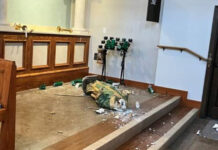An Iranian Christian couple serving a combined 10 years in prison for belonging to a house-church have had their third

application for a retrial accepted.
Sara Ahmadi, who will turn 45 on Friday, and Homayoun Zhaveh, who is 64 and has advanced Parkinson’s disease, were informed of the decision on Easter Day.
The ruling was made by Branch 9 of the Supreme Court, the same branch that agreed last month to a retrial in the case of an Iranian-Armenian pastor, Joseph Shahbazian, serving a 10-year sentence for holding church services in his home.
Sara and Homayoun’s case will be reviewed by Branch 34 of Tehran’s appeal court on 9 May.
The couple have been in prison since August last year, when they were surprisingly detained after answering a summons which they believed would only see them reunited with property confiscated from them by the agents who arrested them.
They were arrested back in June 2019, sentenced in November 2020, and first answered a summons to serve their sentences in June 2021, only to be told they could return home.
Their first two applications for a retrial – in June 2021 and November 2021 – were both rejected.
In June 2021, Article18 launched a petition for the charges against the couple to be dropped. Today, that ongoing petition calls for them to be released, noting that: “As a signatory to the International Covenant on Civil and Political Rights, Iran has a binding obligations to respect and protect the right to religious freedom.”
The UN’s special rapporteur on the human rights situation in Iran, Javaid Rehman, highlighted Iran’s breaches of this covenant during the launch of Article18’s joint annual report at the UN Human Rights Council in Geneva last month.
“Everyone has the right to freedom of thought, conscience, and religion, and everyone has the right to have a religion, to adopt another religion, of his or her choice, without any coercion,” he said. “And these are what we call ‘non-derogable’. You cannot derogate from that. Whatever religion or faith I choose for myself, there must not be any interference; the state cannot say, ‘Well, you know, there are public security issues, national security.’ This is my choice! And this is very important for all states to recognise, including Iran.”






